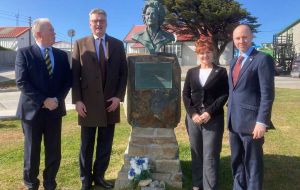MercoPress. South Atlantic News Agency
The future of the Chagossian people and sovereignty for British Indian Ocean Territory
 Members of the APPG Falklands at the Tumbledown Mount monument to the Scottish Guards
Members of the APPG Falklands at the Tumbledown Mount monument to the Scottish Guards By Daniel Kawczynski, MP for Shrewsbury & Atcham since 2005 - Before I start to talk about this British Overseas Territory, I would like to say that I returned last week from another British Overseas Territory—the Falkland Islands—with my hon. Friend James Sunderland and Stephen Doughty, who is the shadow Minister for the Overseas Territories.
We have just spent nine days together in the Falkland Islands, inspecting the defenses' of the Islands, meeting Islanders and, most importantly, commemorating the 40th anniversary celebrations of the Liberation of the Islands in June 1982. I pay tribute to the shadow Minister.
During our visit, he and I disagreed on almost everything: politically, culturally, socially—everything. But we were in unison and total agreement on the need to protect the Falkland Islands and their right to self-determination, a concept to which I will return over and again during my speech and this debate. It is the lesson we have learned from the conflict in the Falkland Islands.
I recognize that the British Indian Ocean Territory is different from the Falkland Islands, and there are different perspectives, narratives and parameters, but one thing that is not divisible and is equally important in any British Overseas Territory is the concept of self-determination; we cannot negotiate sovereignty of a territory without the legitimacy of consultation with the islanders and the people originally from that territory.
I mention the Falkland Islands because we have to learn from our mistakes and from the mistakes the Foreign Office has made in the past. Something I was told over and again during our visit to the Falkland Islands was that Lord Chalfont, a Labour Minister in the Foreign Office in the late ’60s, was sent to the Falkland Islands in 1968 by the Foreign Office to try to convince the Islanders to abandon Great Britain, ditch their links with Britain and become Argentine. The Falkland Islands’ people repeatedly referenced—and have written pamphlets and books about—that occasion, when a Labour Foreign Office Minister was sent to the Falkland Islands to try to entice, cajole and manoeuvre an entire people to abandon their cultural heritage, their links and their status as part of the British family. I am pleased that the Falkland Islanders sent Lord Chalfont back home with the unequivocal message, “We wish to remain British, we are British and we are determined to continue to be part of the British family.” I would argue that the poor handling of the Falkland Islands situation by the Foreign Office in the late ’60s and ’70s led and contributed to the war that then was instigated in 1982.
Something I will not forget from my visit to the Falkland Islands is when my hon. Friend the Member for Bracknell, the hon. Member for Cardiff South and Penarth and I were taken to the top of Mount Tumbledown, and saw the horrendous situation our armed forces faced in trying to retake the islands. We paused on many occasions during our trip to lay wreaths and spend time quietly together, commemorating the lives of the British soldiers who gave up their lives to protect that British territory.
When the Foreign Office makes mistakes and miscalculates, it is not civil servants or politicians who suffer, but British soldiers, who sometimes have to lay down their lives. Now I believe the Foreign Office is making the same mistakes with the British Indian Ocean Territory that it made with the Falkland Islands. I am deeply concerned that the former Prime Minister, my right hon. Friend Elizabeth Truss, made the decision in her extraordinarily brief premiership to start negotiations with Mauritius over the sovereignty of those 58 beautiful islands in the Indian ocean.
I have debated this issue with many colleagues, and the message from some of them is this: we are in negotiations with Mauritius, due to rulings against us at the United Nations and at the International Court of Justice, so let us conclude those negotiations and then at some stage we will consult the Chagossians. Those are the responses I have received to many written parliamentary questions: “Do not interfere in the negotiations now. Let us conclude these sensitive negotiations—it is all rather discreet—and at some stage in future we will consult the Chagossians.” No, no, no. That puts the cart before the horse. If the Government have any intention to transfer even one of those 58 islands, they need to have a referendum of the Chagossian people. They need to make a decision themselves, rather than our Government even starting to negotiate with Mauritius.
Right hon. and hon. Members will know that the Labour Government of the late 1960s expelled between 1,400 and 1,700 Chagossians. I am pleased that my hon. Friend Henry Smith is here, as he represents a large contingent of Chagossians who settled in his constituency when they arrived in the United Kingdom. I look forward to hearing what he has to say. Mike Kane also represents 400 Chagossians. Between them, those two gentlemen represent the lion’s share of Chagossians who live in the United Kingdom.





Top Comments
Disclaimer & comment rulesCommenting for this story is now closed.
If you have a Facebook account, become a fan and comment on our Facebook Page!